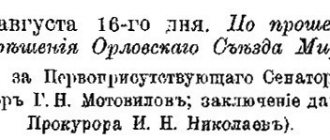Errors in appeal
Lawyers typically make three basic mistakes in appellate court.
They do not check the unconditional grounds for canceling a decision
This is a strong argument for overturning the decision, but it is often overlooked. Lawyers are too keen on justifying their position and describing the circumstances, but forget to check whether there are unconditional procedural violations in the case.
If the appellant finds at least one such violation, the court will cancel the decision and reconsider the case according to the rules of the first instance, that is, it will reconsider the dispute on the merits. During such a review, it will be possible to submit petitions and statements, present evidence, if for some reason they did not do this in the first instance.
Most often in complaints, appellants refer to two violations - the court considered the case without a person participating in the case, who was not notified of the time and place of the hearing, or the court made a decision on the rights and obligations of persons who were not involved in the case.
If the judge in the case was illegally replaced or territorial jurisdiction was violated, you can refer to the consideration of the case in an illegal composition of the court.
Check if there is a court record in the case - higher courts often overturn decisions due to its absence. If there is no audio recording of the court hearing in the case, the courts can also overturn the decision on the same grounds.
The appeal will overturn the decision if there is no audio recording, but it contained information that served as the basis for the adoption of a judicial act. Therefore, indicate in your complaint what important information was on the audio recording. For example, interrogation of witnesses, experts, examination of evidence.
Lawyers are bad at building a defense
The lawyer cites in the appeal an endless list of court errors from serious to insignificant.
For example, when he points out that the judge incorrectly applied the rules and was not wearing a robe, the second argument clearly negates the seriousness of the first. The appellants usually formulate the violations themselves in general terms - without reference to specific evidence and case materials. Judges rarely take such complaints positively.
Recommendation - write no more than four to five clearly stated reasons for cancellation. In each argument, it is advisable to describe three points: the lower court's error, the incorrect conclusion it reached because of that error, and the conclusion the court should have reached.
Lawyers are passive during appeals
When the court has already considered the case on its merits, lawyers think that their task in the appeal is only to present arguments for and against the court’s decision. This is not entirely true. An appeal is the last opportunity to close evidentiary gaps in the positions of the parties in the case. Take advantage of this.
Try to present evidence essential to the case in the appeal, file motions. The appellate authority may accept additional evidence from a party and consider requests for new evidence, but only in two cases. The first case is if the party justifies that it could not present them to the first instance for valid reasons. The second is if the court of first instance rejected them. That is, in the appeal it is necessary to once again state all the petitions and evidence that were rejected by the first instance.
If you did not present evidence at the first instance, but it is essential to the case, still present it on appeal. If you cannot give good reasons or they are clearly “extracted,” the likelihood that the court will accept the evidence or satisfy the petition still remains: the court would rather accept new evidence than not accept it at the risk of canceling the judicial act.
For example, a company filed a claim against the company for unjust enrichment. Since the defendant did not provide evidence that he withheld the transferred money justifiably, the court granted the claim. To the appellate court, the defendant presented contracts and service acceptance certificates, which confirmed the existence of obligations between the plaintiff and the defendant and the basis for payments. The appeal added documents to the case and dismissed the claim. The higher courts agreed with the appellate court.
Decisions of the court of appeal in criminal cases
Based on the results of the consideration of the criminal case, the appellate court makes one of the following decisions:
- to leave the sentence, ruling, resolution unchanged, and the complaint or presentation unsatisfied;
- on the reversal of a conviction and on an acquittal;
- on the reversal of a conviction and on the imposition of a guilty verdict;
- on the cancellation of the sentence, ruling, decision of the court of first instance and on the transfer of the criminal case for a new trial to the court of first instance;
- on the reversal of the acquittal and on the imposition of an acquittal;
- on the cancellation of the ruling or resolution and on the issuance of an acquittal or other court decision;
- on the cancellation of the sentence, ruling, resolution and on the return of the case to the prosecutor; on the reversal of a sentence, ruling, resolution and on the termination of a criminal case;
- about changing the sentence or other appealed court decision;
- to terminate the appeal proceedings.
In general, it can be stated that the appellate court can make any decision based on the results of the review of the case. The grounds for canceling or changing a court decision on appeal are:
- discrepancy between the court's conclusions set out in the verdict and the actual circumstances of the criminal case established by the court of first instance;
- significant violation of criminal procedure law;
- misapplication of criminal law;
- unfairness of the sentence;
- identification of the circumstances specified in Part 1 and Clause 1 of Part 2 of Art. 237 of the Code of Criminal Procedure of the Russian Federation, obliging the return of the criminal case to the prosecutor;
- identification of data indicating a person’s non-compliance with the conditions and his failure to fulfill obligations stipulated by the pre-trial cooperation agreement.
The sentence is recognized as inconsistent with the actual circumstances of the criminal case established by the court of first instance if:
- the court's conclusions are not supported by the evidence considered at the court hearing;
- the court did not take into account circumstances that could significantly influence the court’s conclusions;
- the verdict does not indicate on what grounds, in the presence of contradictory evidence that is significant for the court’s conclusions, the court accepted some of this evidence and rejected others;
- the court's conclusions set out in the verdict contain significant contradictions that influenced or could influence the resolution of the issue of guilt or innocence of the convicted or acquitted person, the correct application of the criminal law or the determination of the penalty.
Significant violations of the Code of Criminal Procedure of the Russian Federation are those violations that, by depriving or limiting the guaranteed rights of participants in criminal proceedings, non-compliance with the legal procedure, or in any other way, influenced or could influence the adoption of a lawful and justified court decision, for example:
- non-termination of a criminal case by the court if there are grounds provided for in Art. 254 Code of Criminal Procedure of the Russian Federation;
- making a decision by a court by an illegal composition of the court or rendering a verdict by an illegal composition of a jury;
- consideration of a criminal case in the absence of the defendant, with the exception of cases provided for in Part. 4, 5 tbsp. 247 Code of Criminal Procedure of the Russian Federation;
- consideration of a criminal case without the participation of a defense attorney, if his participation is mandatory in accordance with the Code of Criminal Procedure of the Russian Federation, or in other violation of the right of the accused to benefit from the assistance of a defense attorney;
- violation of the defendant’s right to testify in his native language or a language he speaks and to have the assistance of an interpreter;
- failure to provide the defendant with the right to participate in the debate between the parties;
- depriving the defendant of the last word;
- violation of the secrecy of the jury's deliberations when rendering a verdict or the secrecy of the judges' deliberations when rendering a verdict;
- substantiation of the verdict by evidence declared inadmissible by the court; 10) absence of signature of the judge or one of the judges, if the criminal case was considered by the court collectively, on the corresponding court decision; 11) lack of minutes of the court hearing.
Incorrect application of criminal law is observed in the following cases:
- violation of the requirements of the General Part of the Criminal Code of the Russian Federation;
- application of the wrong article or the wrong paragraph and (or) part of the article of the Special Part of the Criminal Code of the Russian Federation that were subject to application;
- imposing a punishment more severe than provided for in the relevant article of the Special Part of the Criminal Code of the Russian Federation.
An unjust sentence is one for which a punishment was imposed that does not correspond to the gravity of the crime, the personality of the convicted person, or a punishment that, although it does not go beyond the limits provided for by the relevant article of the Special Part of the Criminal Code of the Russian Federation, is unjust in its type or extent due to excessive lenity, and due to excessive severity.
The instructions of the appellate court are mandatory for the court of first instance and for the prosecutor if the criminal case is returned to eliminate circumstances that impede the adoption of a lawful and informed decision. When a verdict or other court decision is overturned and a criminal case is transferred for a new trial or when a criminal case is returned to the prosecutor, the appellate court does not have the right to prejudge questions about:
- whether the accusation has been proven or not;
- the reliability or unreliability of this or that evidence;
- the advantages of some evidence over others;
- type and amount of punishment.
When considering a criminal case on appeal, the court overturns the conviction or other decision of the court of first instance and terminates the criminal case if there are grounds provided for in Art. 24, 25, 27 and 28 of the Code of Criminal Procedure of the Russian Federation. A conviction or other decisions of the court of first instance are subject to cancellation and the transfer of the criminal case to a new trial if, during the consideration of the case in the court of first instance, violations of criminal procedure and (or) criminal laws were committed that cannot be corrected in the court of appeal.
A conviction pronounced on the basis of a jury verdict and contradicting it, if there are grounds provided for by law, is subject to cancellation with the transfer of the criminal case for a new trial to the court that passed the verdict, but by a different composition of the court from the moment following the announcement of the jury verdict. In cases where a criminal case is transferred for a new trial to the court that passed the sentence, then it must be considered by a different composition of the court; if the verdict or other final decision of the magistrate is canceled - to the magistrate of another judicial district (that is, the same judge or the same composition courts cannot re-examine the case, since they are subject to recusal). If a violation committed by the court can be eliminated when considering a criminal case on appeal, the appellate court eliminates this violation, cancels the sentence, ruling, decision of the court of first instance and makes a new court decision. The provisions of the law regulating the limits of the rights of the appellate instance are important. Thus, a conviction, ruling, or decision of the court of first instance can be changed in the direction of worsening the situation of the convicted person only upon the proposal of the prosecutor or a complaint from the victim, private prosecutor, their legal representatives and (or) representatives.
The acquittal of the court of first instance may be canceled by the appellate court with the transfer of the criminal case to a new trial only upon the proposal of the prosecutor or a complaint from the victim, private prosecutor, their legal representatives and (or) representatives about the illegality and groundlessness of the acquittal of the defendant. An acquittal, rendered on the basis of a not guilty verdict by a jury, may be canceled upon the proposal of the prosecutor or a complaint from the victim or his legal representative and (or) representative only if there are such significant violations of the criminal procedure law that have limited the rights of the prosecutor, the victim or his legal representative representative and (or) representative on the presentation of evidence or influenced the content of the questions posed to the jurors or the content of the answers given by the jurors. An acquittal pronounced on the basis of a jury verdict is subject to cancellation if, in the event of an unclear and contradictory verdict, the presiding judge did not point out to the jurors the ambiguity and contradictory nature of the verdict and did not invite them to return to the deliberation room to make clarifications in the question sheet. When changing a sentence or other court decision on appeal, the court has the right:
- mitigate the sentence of the convicted person or apply the criminal law against him for a less serious crime;
- increase the sentence for the convicted person or apply a criminal law against him for a more serious crime;
- reduce or increase the amount of compensation for material damage and compensation for moral damage;
- change to a softer or more strict type of correctional institution in accordance with the requirements of Art. 58 of the Criminal Code of the Russian Federation;
- resolve questions about material evidence, procedural costs and other issues.
The decisions of the appellate court are the appellate verdict, ruling and decree. The appeal verdict is rendered on behalf of the Russian Federation in the manner established by Art. 297–313 Code of Criminal Procedure of the Russian Federation. The appeal ruling or resolution shall indicate:
- date and place of issue;
- name and composition of the court;
- information about the person who filed the appeal or presentation;
- information about persons participating in the court hearing;
- a summary of the contents of the decision of the court of first instance;
- a summary of the arguments of the person who filed the appeal or presentation, as well as the objections of other persons;
- reasons for the decision made;
- decision of the appellate court on an appeal or presentation;
- decision on the preventive measure.
The appeal verdict, ruling, resolution shall indicate the grounds on which the verdict is recognized as legal, justified and fair, another court decision of the court of first instance is legal and justified, and the complaint or presentation is not subject to satisfaction, or the grounds for complete or partial cancellation or change of the appealed court decision. solutions. The appeal verdict is rendered, appeal rulings and decisions are made in the deliberation room and signed by the entire composition of the court. The judge who remains with a dissenting opinion has the right to express it in writing in the deliberation room in compliance with the requirements of Part 5 of Art. 301 Code of Criminal Procedure of the Russian Federation.
The dissenting opinion is attached to the criminal case and is not subject to announcement in the courtroom. The introductory and operative parts of the decision of the appellate court are announced upon the court's return from the deliberation room. The issuance of a reasoned court decision may be postponed for no more than 3 days from the date of completion of the criminal case, as announced by the presiding judge to the parties. The operative part of the court decision must be signed by all judges and attached to the case. If there is a dissenting opinion of the judge on a decision made by the court, the presiding judge explains to the participants in the trial the right to file a petition for familiarization with the dissenting opinion of the judge and the period for such familiarization.
The appeal verdict, ruling, decision within 7 days from the date of their issuance are sent along with the criminal case for execution to the court that passed the sentence. A copy of the appeal verdict, resolution or determination or an extract from their operative part, according to which the convicted person is subject to release from custody or from serving a sentence, is immediately sent to the administration of the place of detention or the administration of the place of serving the sentence, respectively. If a convicted person participates in a hearing of an appellate court, the appeal verdict, resolution or ruling regarding the release of the convicted person from custody or from serving a sentence is executed immediately. The secretary of the court session keeps the minutes of the court session in accordance with the requirements of Art. 259 Code of Criminal Procedure of the Russian Federation. Based on the content of the protocol, the parties can submit comments on it, which are considered by the presiding officer in the manner established by Art. 260 Code of Criminal Procedure of the Russian Federation. The verdict, ruling, decision of the appellate court may be appealed to a higher court in the manner established by Chapter. 471 (in cassation procedure) and 481 of the Code of Criminal Procedure of the Russian Federation (in supervisory order).
Errors in cassation
Lawyers make six common mistakes. The first three were discussed in the section on appeal. Three more errors are typical only for cassation.
The arguments of the complaint go beyond the scope of cassation consideration
In 99 percent of cases when cassation upholds decisions of lower courts, it indicates that the arguments of the complaint are aimed at reassessing the factual circumstances of the case and evidence. And this is not within the scope of consideration of the case in cassation. Cassation only checks whether the courts correctly applied the rules of substantive and procedural law.
The reason for this practice is that lawyers often copy the text of the appeal into the cassation complaint. For example, the complaint writes that “the conclusions of the courts do not correspond to the factual circumstances and the evidence presented in the case.”
If you want to present new evidence or perform procedural actions that are possible only in the first instance, look for unconditional grounds for reversing the decision.
In your cassation appeal, refer specifically to errors in the application of the rules - these are your main arguments. All arguments that are related to non-research or incorrect assessment of evidence are given only to confirm the court’s errors.
The arguments of the complaint do not correspond to the pleading purpose
The goal of the cassator is to achieve the reversal of judicial acts with which he does not agree. To do this, he can ask the cassation court, for example, to adopt a new judicial act in the case, to send the case for a new trial, or to leave in force one of the decisions or resolutions previously adopted in the case. Sometimes cassation officers ask to adopt a new act in the case - this is the most advantageous for the party, regardless of the circumstances of the case and the arguments that it brings.
The cassation court will not be able to adopt a new act, since to do this it will have to examine and evaluate the evidence, and the cassation court does not have the right to do this. Such a discrepancy between the request and the arguments reduces the credibility of the complaint and often raises questions and criticism in the court of cassation.
Study the case materials and select possible arguments for cassation. After this, decide how to formulate the pleading part of the cassation appeal.
Additional documents submitted too late
Lawyers often file position papers too late and draft them incorrectly. Courts usually accept documents directly at the hearing, but not cassation documents. If you submit a response to the complaint, additions, or written explanations directly to the hearing, the cassation office may reject them. For example, the court indicated that written explanations were received on the eve of the court hearing and refused to include them in the case materials.
Consider the peculiarities of the court. For example, the Arbitration Court of the Moscow District may not accept written explanations, since it considers them new evidence that the cassation cannot accept. Therefore, format additional explanations as the text of a speech - the courts usually accept it.
CALL +7 (495) 255-11-80, FREE CONSULTATION!




